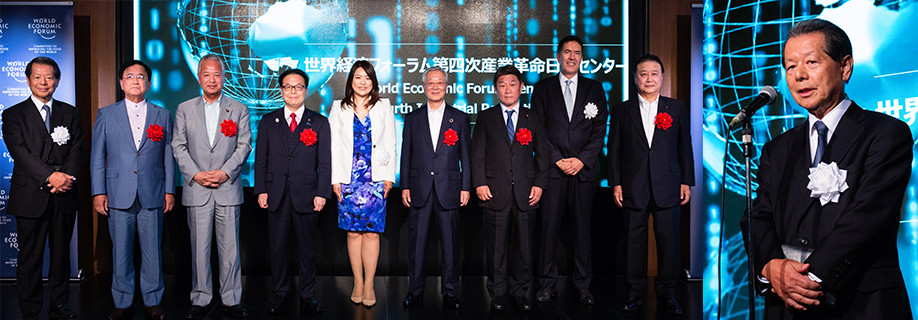- The World Economic Forum opened the Centre for the Fourth Industrial Revolution Japan to create new technology policies that benefit all in partnership with METI and API on 2 July 2018
- Founding centre partners from Hitachi, Horiba, Mitsubishi Chemical Holdings, Salesforce, Sompo Holdings and Suntory Holdings take part in launch
- The centre will initially focus on autonomous mobility, data policy and precision medicine
- It will bring together leading businesses, start-ups, civil society, academia and international organizations to shape the trajectory of emerging technologies and position Japan as a global leader in the Fourth Industrial Revolution
- More information on the Centre for the Fourth Industrial Revolution Network and projects
Tokyo, Japan, 2 July 2018
The World Economic Forum, the International Organization for Public-Private Cooperation, today opened the Centre for the Fourth Industrial Revolution Japan alongside inaugural partners Hitachi, Horiba, Mitsubishi Chemical Holdings, Salesforce, Sompo Holdings and Suntory Holdings.
The Tokyo-based centre will bring together leading businesses, start-ups, civil society, academia and international organizations to shape the trajectory of emerging technologies. Its mission is to co-design and pilot new approaches to policy that maximize the benefits and minimize the risks of science and technology.
The Centre for the Fourth Industrial Revolution Japan will be part of the World Economic Forum’s global network of centres working to lay the foundations for a fairer, more sustainable, more prosperous world. It is the first such centre to open outside of the United States, with other centres opening in India and China later this year.
“The Fourth Industrial Revolution is the determining force shaping not only industries and economies, but also societies,” said Klaus Schwab, Founder and Executive Chairman of the World Economic Forum. “New technologies – such as artificial intelligence, precision medicine, autonomous vehicles and many others – offer great potential to lift humankind to new levels of well-being, but there is an urgent need to determine the ethical rules and policies around these technologies. For this reason, the World Economic Forum is creating a network of Centres for the Fourth Industrial Revolution, enabling business, governments and civil society to work together to ensure a human-centred future for innovation.”
“Technology will continue to advance,” said Yoichi Funabashi, Chairman of the Asia Pacific Initiative, Japan. “Governments have an obligation to harness technological advancement for the benefit of society. Enlightened governments have a chance to attract best entrepreneurs, companies, experiments and data from around the world. Japan needs to be at the forefront of this new global reality and forge a new model of public-private partnership that will shape the Fourth Industrial Revolution.”
Building on the work started at centre headquarters in San Francisco, the Centre for the Fourth Industrial Revolution Japan will focus on initially on autonomous mobility, data policy and precision medicine. Project teams will work to co-design policy frameworks and standards that will be piloted by government and business in Japan and around the world.
The world’s top businesses and most visionary governments are working together to build the policies and rules to make a brighter future. A full list of partners and members of the Centre for the Fourth Industrial Revolution can be viewed here.
The Centre for the Fourth Industrial Revolution Japan is managed by the World Economic Forum in collaboration with Japan’s Ministry for Economy, Trade and Industry (METI) and the Asia Pacific Initiative (API).
About the World Economic Forum Centre for the Fourth Industrial Revolution
Based in San Francisco, the centre brings together governments, leading companies, civil society and experts from around the world to co-design and pilot innovative approaches to the policy and governance of technology. Its vision is to shape the development and use of technology in ways that maximize the benefits and minimize the risks. The centre will develop, implement and scale agile and human-centred pilot projects that can be adopted by policy-makers, legislators and regulators worldwide.
 APIニュースレター 登録
APIニュースレター 登録